python 爬取豆瓣书籍信息
继爬取 猫眼电影TOP100榜单 之后,再来爬一下豆瓣的书籍信息(主要是书的信息,评分及占比,评论并未爬取)。原创,转载请联系我。
需求:爬取豆瓣某类型标签下的所有书籍的详细信息及评分
语言:python
支持库:
- 正则、解析和搜索:re、requests、bs4、lxml (后三者需要安装)
- 随机数:time、random
步骤:三步走
- 访问标签页面,获取该标签下的所有书籍的链接
- 逐一访问书籍链接,爬取书籍信息和评分
- 持久化存储书籍信息(这里用了excel,可以使用数据库)
一、访问标签页面,获取该标签下的所有书籍的链接
照例,我们先看一下豆瓣的Robots.txt , 不能爬取禁止的内容。
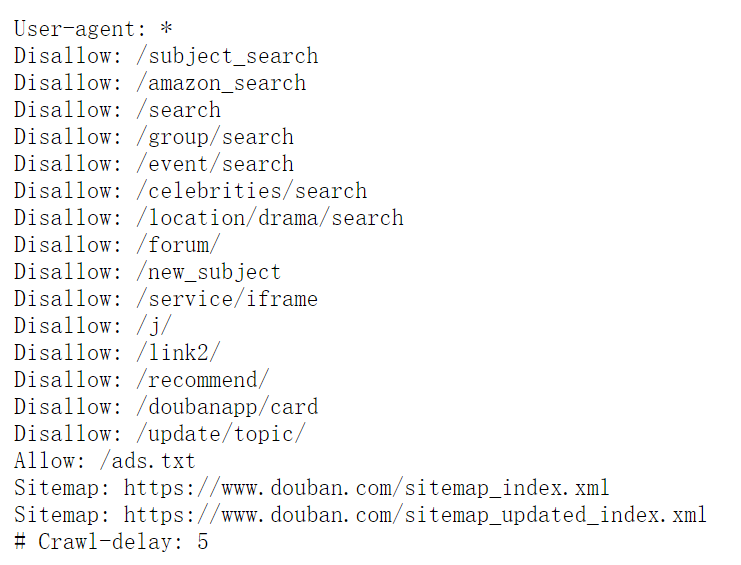
我们这一步要爬取的标签页面,以小说为例 https://book.douban.com/tag/%E5%B0%8F%E8%AF%B4
先去看看它的HTML结构
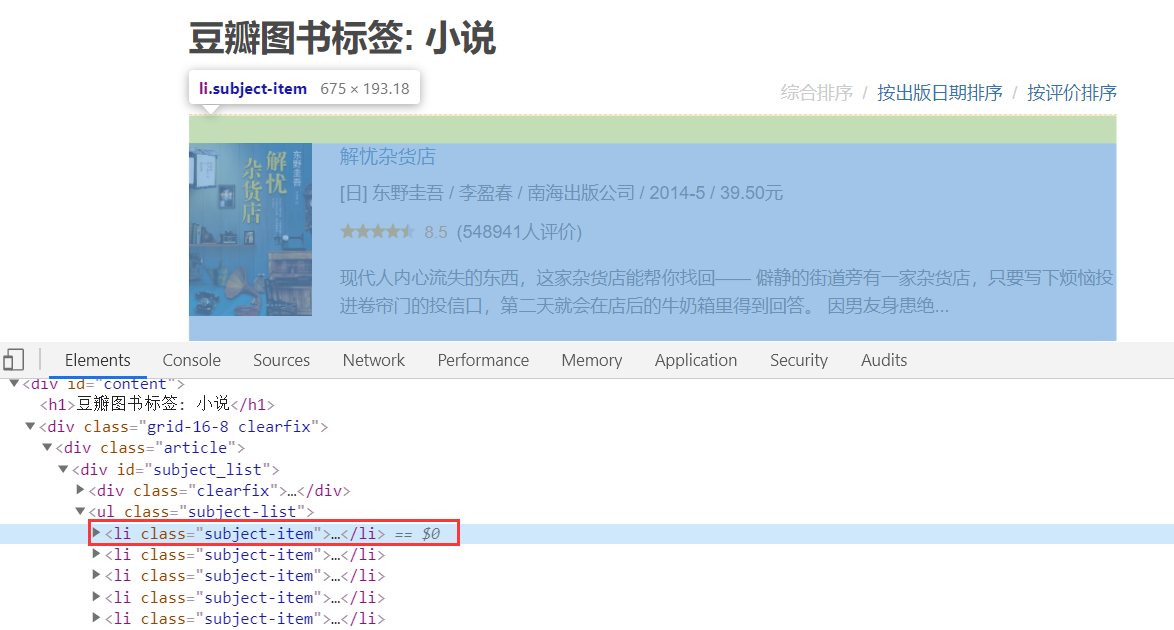
发现,每一本书,都在一个<li>标签当中,而我们需要的只是那张图片的链接(就是书籍页面的链接)

这样,就可以写正则或者是利用bs4(BeatuifulSoup)来获取书籍的链接。
可以看到,每一页只显示了20本书,所以需要遍历访问所有的页面,它的页面链接也是有规律的。
第二页:https://book.douban.com/tag/%E5%B0%8F%E8%AF%B4?start=20&type=T
第三页:https://book.douban.com/tag/%E5%B0%8F%E8%AF%B4?start=40&type=T
即:start每次递增20就好了。
下面来看代码:
# -*- coding: utf-8 -*-
# @Author : yocichen
# @Email : yocichen@126.com
# @File : labelListBooks.py
# @Software: PyCharm
# @Time : 2019/11/11 20:10 import re
import openpyxl
import requests
from requests import RequestException
from bs4 import BeautifulSoup
import lxml
import time
import random src_list = [] def get_one_page(url):
'''
Get the html of a page by requests module
:param url: page url
:return: html / None
'''
try:
head = ['Mozilla/5.0', 'Chrome/78.0.3904.97', 'Safari/537.36']
headers = {
'user-agent':head[random.randint(0, 2)]
}
response = requests.get(url, headers=headers, proxies={'http':'171.15.65.195:9999'}) # 这里的代理,可以设置也可以不加,如果失效,不加或者替换其他的即可
if response.status_code == 200:
return response.text
return None
except RequestException:
return None def get_page_src(html, selector):
'''
Get book's src from label page
:param html: book
:param selector: src selector
:return: src(list)
'''
# html = get_one_page(url)
if html is not None:
soup = BeautifulSoup(html, 'lxml')
res = soup.select(selector)
pattern = re.compile('href="(.*?)"', re.S)
src = re.findall(pattern, str(res))
return src
else:
return [] def write_excel_xlsx(items, file):
'''
Write the useful info into excel(*.xlsx file)
:param items: book's info
:param file: memory excel file
:return: the num of successful item
'''
wb = openpyxl.load_workbook(file)
ws = wb.worksheets[0]
sheet_row = ws.max_row
item_num = len(items)
# Write film's info
for i in range(0, item_num):
ws.cell(sheet_row+i+1, 1).value = items[i]
# Save the work book as *.xlsx
wb.save(file)
return item_num if __name__ == '__main__':
total = 0
for page_index in range(0, 50): # 这里为什么是50页?豆瓣看起来有很多页,其实访问到后面就没有数据了,目前是只有50页可访问。
# novel label src : https://book.douban.com/tag/%E5%B0%8F%E8%AF%B4?start=
# program label src : https://book.douban.com/tag/%E7%BC%96%E7%A8%8B?start=
# computer label src : https://book.douban.com/tag/%E8%AE%A1%E7%AE%97%E6%9C%BA?start=
# masterpiece label src : https://book.douban.com/tag/%E5%90%8D%E8%91%97?start=
url = 'https://book.douban.com/tag/%E5%90%8D%E8%91%97?start='+str(page_index*20)+'&type=T' # 你要做的就是把URL前面的部分替换成你所有爬的那个标签的对应部分,确切的来说是红色加粗的文字部分。
one_loop_done = 0
# only get html page once
html = get_one_page(url)
for book_index in range(1, 21):
selector = '#subject_list > ul > li:nth-child('+str(book_index)+') > div.info > h2'
src = get_page_src(html, selector)
row = write_excel_xlsx(src, 'masterpiece_books_src.xlsx') # 要存储的文件,需要先创建好
one_loop_done += row
total += one_loop_done
print(one_loop_done, 'done')
print('Total', total, 'done')
注释比较清楚了,先获取页面HTML,正则或者bs4遍历获取每一页当中的书籍链接,存到excel文件中。
注意:如果需要直接使用我的代码,你只需要去看一下那个标签页面的链接,而后把红色加粗部分(中文标签编码)替换即可,以及先创建一个excel文件,用以存储爬到的书籍链接。
二、逐一访问书籍链接,爬取书籍信息和评分
上一步我们已经爬到了,小说标签下的所有书籍的src,这一步,就是要逐一去访问书籍的src,然后爬取书籍的具体信息。
先看看要爬的信息的HTML结构
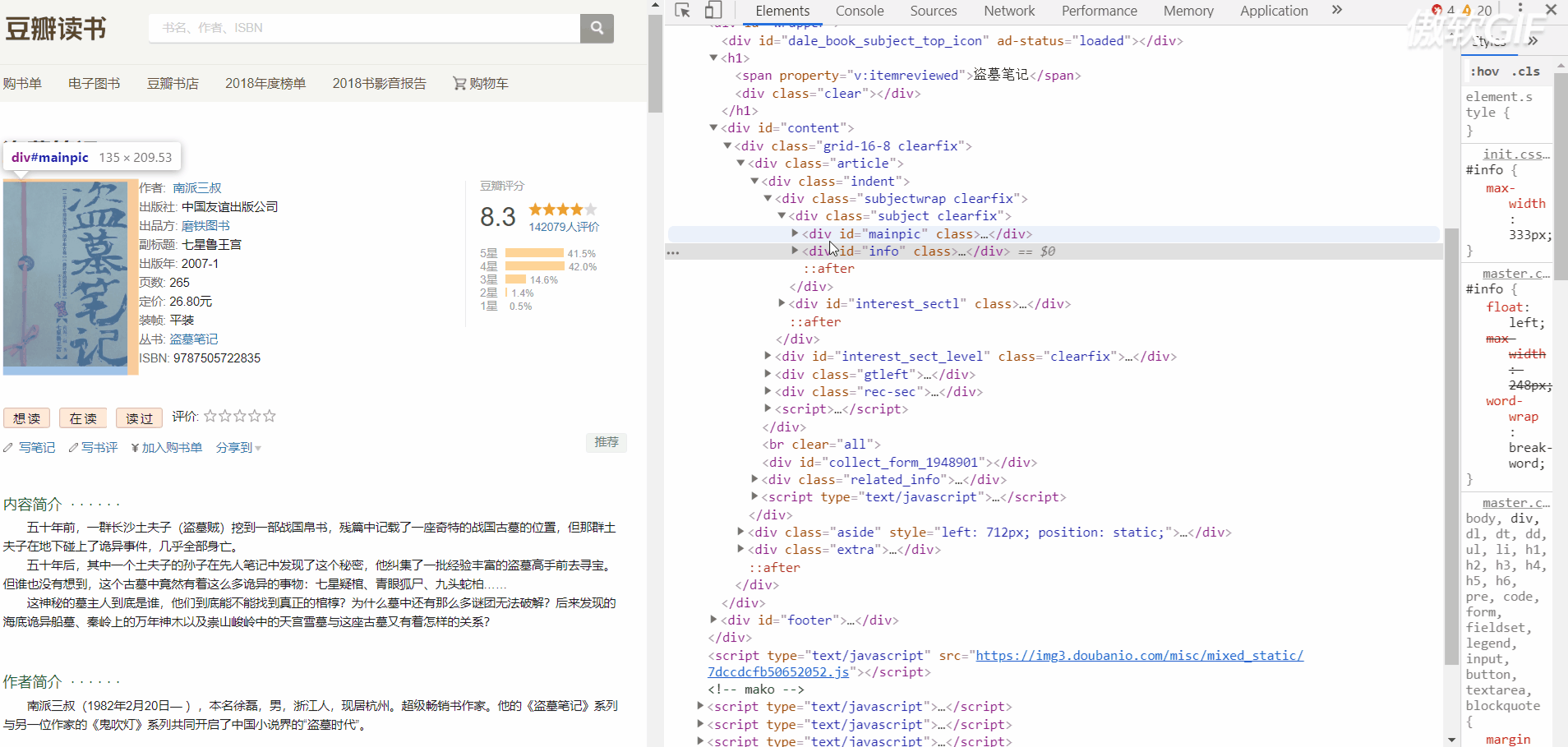
下面是书籍信息页面结构
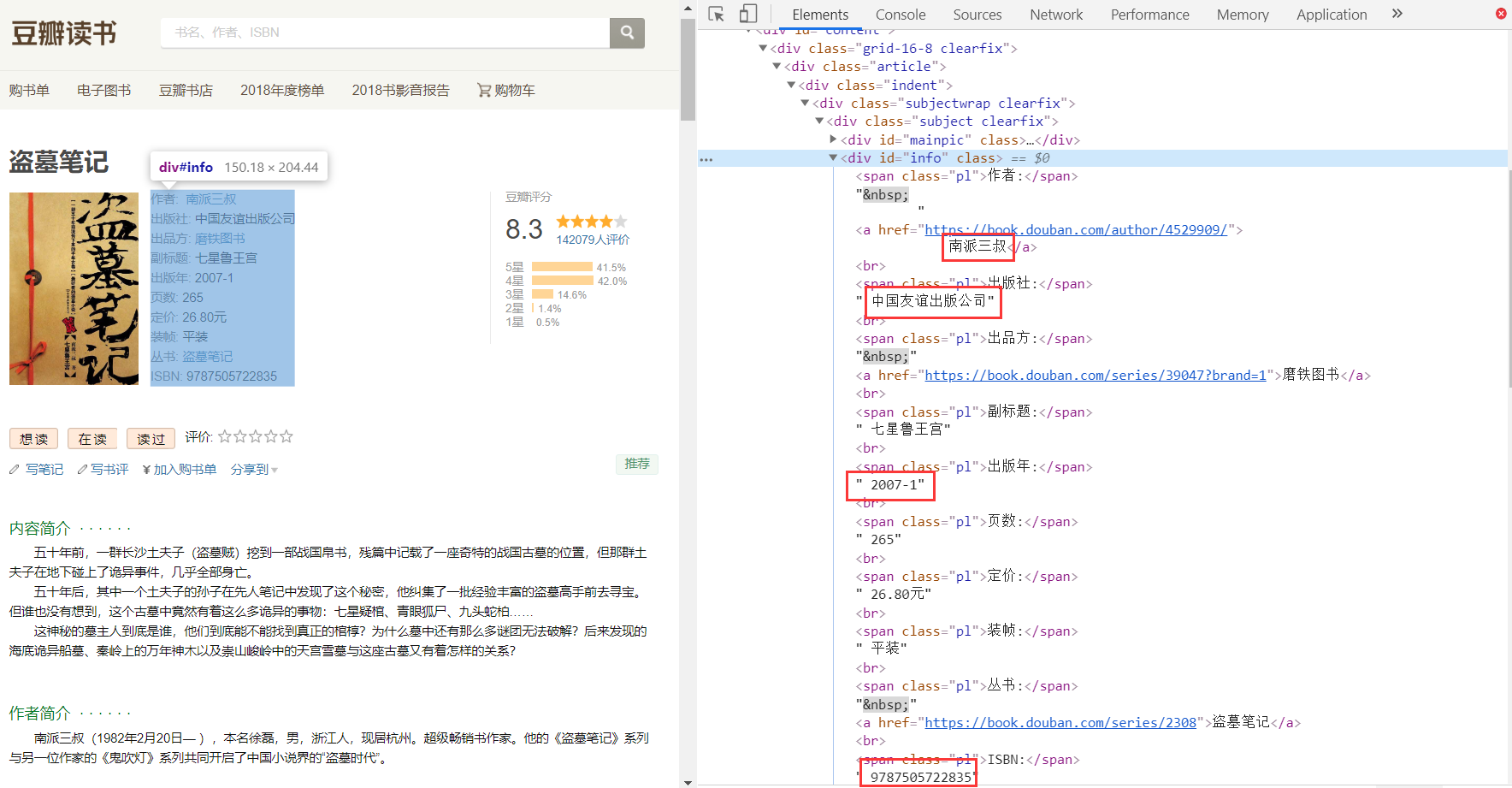
再是评分页面结构
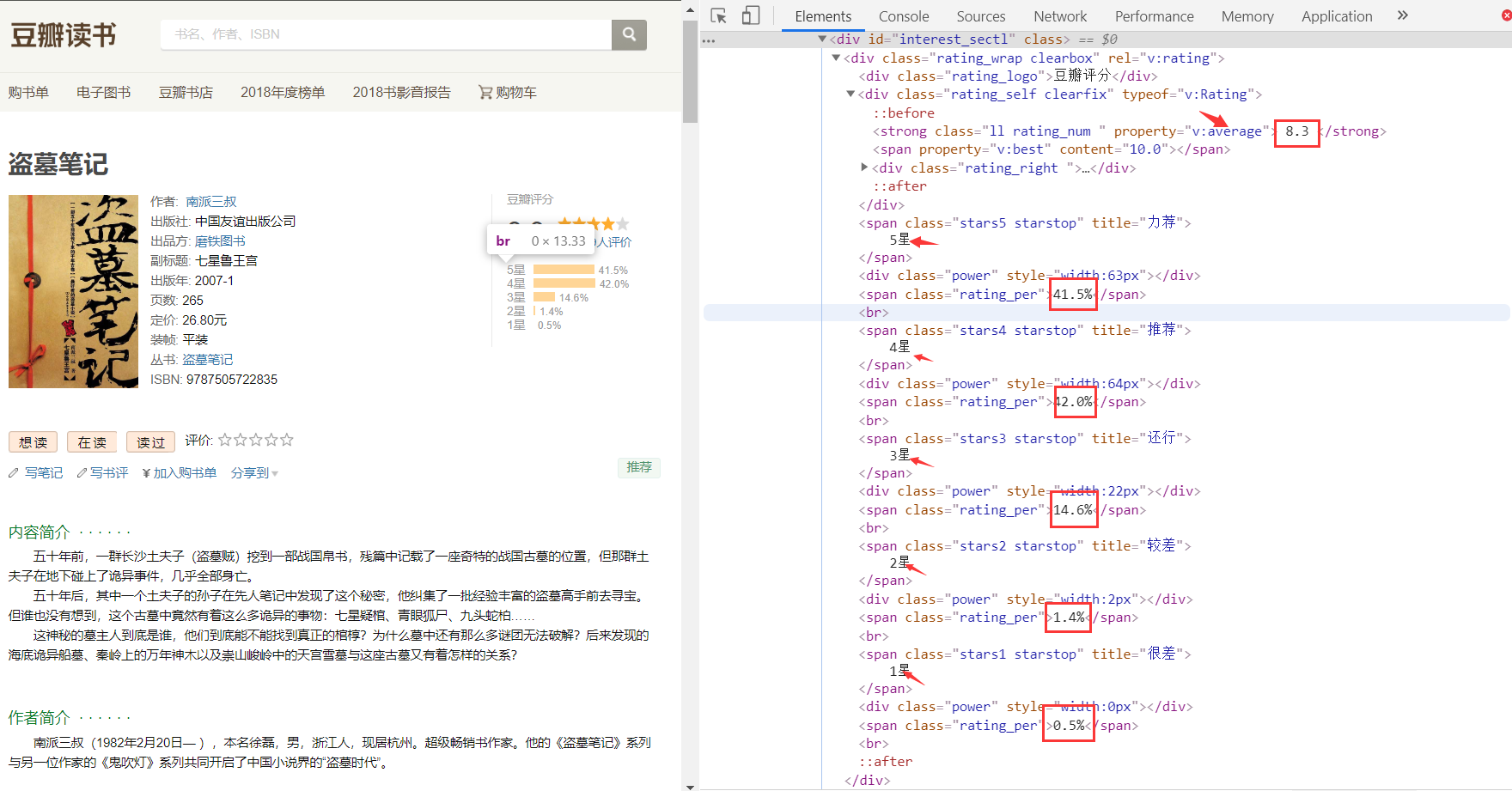
这样就可以利用正则表达式和bs4库来匹配到我们所需要的数据了。(试了试纯正则,比较难写,行不通)
下面看代码
# -*- coding: utf-8 -*-
# @Author : yocichen
# @Email : yocichen@126.com
# @File : doubanBooks.py
# @Software: PyCharm
# @Time : 2019/11/9 11:38 import re
import openpyxl
import requests
from requests import RequestException
from bs4 import BeautifulSoup
import lxml
import time
import random def get_one_page(url):
'''
Get the html of a page by requests module
:param url: page url
:return: html / None
'''
try:
head = ['Mozilla/5.0', 'Chrome/78.0.3904.97', 'Safari/537.36']
headers = {
'user-agent':head[random.randint(0, 2)]
}
response = requests.get(url, headers=headers) #, proxies={'http':'171.15.65.195:9999'}
if response.status_code == 200:
return response.text
return None
except RequestException:
return None def get_request_res(pattern_text, html):
'''
Get the book info by re module
:param pattern_text: re pattern
:param html: page's html text
:return: book's info
'''
pattern = re.compile(pattern_text, re.S)
res = re.findall(pattern, html)
if len(res) > 0:
return res[0].split('<', 1)[0][1:]
else:
return 'NULL' def get_bs_res(selector, html):
'''
Get the book info by bs4 module
:param selector: info selector
:param html: page's html text
:return: book's info
'''
soup = BeautifulSoup(html, 'lxml')
res = soup.select(selector)
# if res is not None or len(res) is not 0:
# return res[0].string
# else:
# return 'NULL'
if res is None:
return 'NULL'
elif len(res) == 0:
return 'NULL'
else:
return res[0].string # Get other info by bs module
def get_bs_img_res(selector, html):
soup = BeautifulSoup(html, 'lxml')
res = soup.select(selector)
if len(res) is not 0:
return str(res[0])
else:
return 'NULL' def parse_one_page(html):
'''
Parse the useful info of html by re module
:param html: page's html text
:return: all of book info(dict)
'''
book_info = {}
book_name = get_bs_res('div > h1 > span', html)
# print('Book-name', book_name)
book_info['Book_name'] = book_name
# info > a:nth-child(2)
author = get_bs_res('div > span:nth-child(1) > a', html)
if author is None:
author = get_bs_res('#info > a:nth-child(2)', html)
# print('Author', author)
author = author.replace(" ", "")
author = author.replace("\n", "")
book_info['Author'] = author publisher = get_request_res(u'出版社:</span>(.*?)<br/>', html)
# print('Publisher', publisher)
book_info['publisher'] = publisher publish_time = get_request_res(u'出版年:</span>(.*?)<br/>', html)
# print('Publish-time', publish_time)
book_info['publish_time'] = publish_time ISBN = get_request_res(u'ISBN:</span>(.*?)<br/>', html)
# print('ISBN', ISBN)
book_info['ISBN'] = ISBN img_label = get_bs_img_res('#mainpic > a > img', html)
pattern = re.compile('src="(.*?)"', re.S)
img = re.findall(pattern, img_label)
if len(img) is not 0:
# print('img-src', img[0])
book_info['img_src'] = img[0]
else:
# print('src not found')
book_info['img_src'] = 'NULL' book_intro = get_bs_res('#link-report > div:nth-child(1) > div > p', html)
# print('book introduction', book_intro)
book_info['book_intro'] = book_intro author_intro = get_bs_res('#content > div > div.article > div.related_info > div:nth-child(4) > div > div > p', html)
# print('author introduction', author_intro)
book_info['author_intro'] = author_intro grade = get_bs_res('div > div.rating_self.clearfix > strong', html)
if len(grade) == 1:
# print('Score no mark')
book_info['Score'] = 'NULL'
else:
# print('Score', grade[1:])
book_info['Score'] = grade[1:] comment_num = get_bs_res('#interest_sectl > div > div.rating_self.clearfix > div > div.rating_sum > span > a > span', html)
# print('commments', comment_num)
book_info['commments'] = comment_num five_stars = get_bs_res('#interest_sectl > div > span:nth-child(5)', html)
# print('5-stars', five_stars)
book_info['5_stars'] = five_stars four_stars = get_bs_res('#interest_sectl > div > span:nth-child(9)', html)
# print('4-stars', four_stars)
book_info['4_stars'] = four_stars three_stars = get_bs_res('#interest_sectl > div > span:nth-child(13)', html)
# print('3-stars', three_stars)
book_info['3_stars'] = three_stars two_stars = get_bs_res('#interest_sectl > div > span:nth-child(17)', html)
# print('2-stars', two_stars)
book_info['2_stars'] = two_stars one_stars = get_bs_res('#interest_sectl > div > span:nth-child(21)', html)
# print('1-stars', one_stars)
book_info['1_stars'] = one_stars return book_info def write_bookinfo_excel(book_info, file):
'''
Write book info into excel file
:param book_info: a dict
:param file: memory excel file
:return: the num of successful item
'''
wb = openpyxl.load_workbook(file)
ws = wb.worksheets[0]
sheet_row = ws.max_row
sheet_col = ws.max_column
i = sheet_row
j = 1
for key in book_info:
ws.cell(i+1, j).value = book_info[key]
j += 1
done = ws.max_row - sheet_row
wb.save(file)
return done def read_booksrc_get_info(src_file, info_file):
'''
Read the src file and access each src, parse html and write info into file
:param src_file: src file
:param info_file: memory file
:return: the num of successful item
'''
wb = openpyxl.load_workbook(src_file)
ws = wb.worksheets[0]
row = ws.max_row
done = 0
for i in range(868, row+1):
src = ws.cell(i, 1).value
if src is None:
continue
html = get_one_page(str(src))
book_info = parse_one_page(html)
done += write_bookinfo_excel(book_info, info_file)
if done % 10 == 0:
print(done, 'done')
return done if __name__ == '__main__':
# url = 'https://book.douban.com/subject/1770782/'
# html = get_one_page(url)
# # print(html)
# book_info = parse_one_page(html)
# print(book_info)
# res = write_bookinfo_excel(book_info, 'novel_books_info.xlsx')
# print(res, 'done')
res = read_booksrc_get_info('masterpiece_books_src.xlsx', 'masterpiece_books_info.xlsx') # 读取的src文件,要写入书籍信息的存储文件
print(res, 'done')
注意:如果要直接使用的话,需要做的只是给参数而已,第一个是上一步获取的src文件,第二个是需要存储书籍信息的文件(需要事先创建一下)
三、持久化存储书籍信息(Excel)
使用excel存储书籍的src列表和书籍的具体信息,需要使用openpyxl库进行读写excel。代码在上面write_*/read_*函数中。
效果
爬到的小说类书籍的src

爬到的书籍详细信息
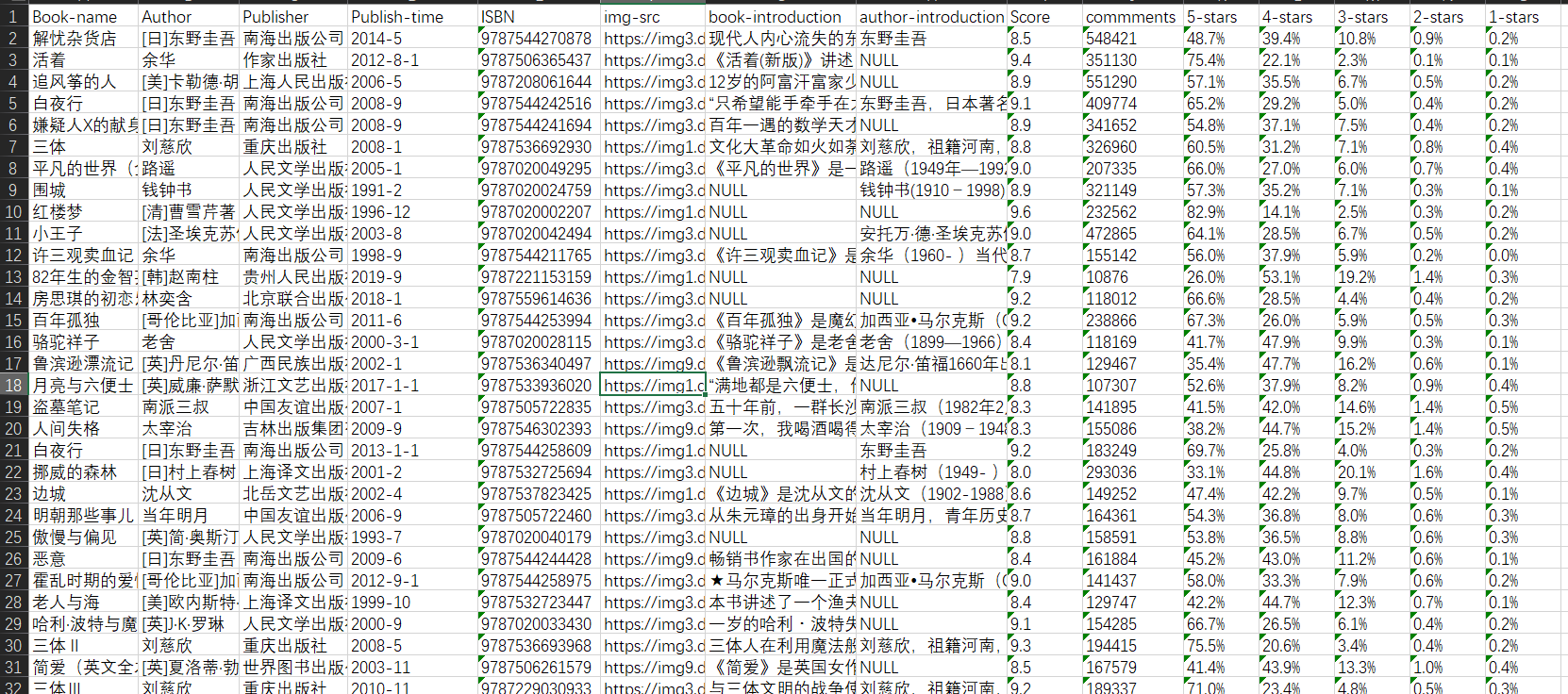
后记
写这个前后大概花了有两整天吧,爬虫要做的工作还是比较细致的,需要分析HTML页面还要写正则表达式。话说,使用bs4真的是很简单,只需要copy一下selector就ok了,较正则可以大大提高效率。另外,单线程爬虫是比较蠢的。还有很多不足(诸如代码不规整,不够健壮),欢迎指正。
参考资料
【1】豆瓣robots.txt https://www.douban.com/robots.txt
【2】https://blog.csdn.net/jerrygaoling/article/details/81051447
【3】https://blog.csdn.net/zhangfn2011/article/details/7821642
【4】https://www.kuaidaili.com/free
最新文章
- SQL*Plus生成html文件
- Java学习笔记(二)
- 【2016-11-7】【坚持学习】【Day22】【工作流引擎设计--执行用户】
- osharp3 整合 dbcontextscope 文章2 将dbcontext的创建收回到ioc管理
- windows dir改成ls
- 清除浮动 .clearfix
- 利用html5中的localStorage获取网页被访问的次数
- C++ Primer 学习笔记_85_模板与泛型编程 --模板特化[续]
- SB中使用Autolayout设置到父视图的间距为0
- [补档]Password
- BlockChain 的跨链技术的重要性和必要性
- 解决 AutoMapper ProjectTo 不起作用的问题
- vue 修饰符
- PAT A1034 Head of a Gang (30 分)——图遍历DFS,字符串和数字的对应保存
- cordic——sincos
- 使用UI管理docker
- javascript 高级程序设计 三
- ssh事务回滚,纪念这几个月困扰已久的心酸
- printf与fprintf函数的区别
- C++中的.和::和:和->的区别